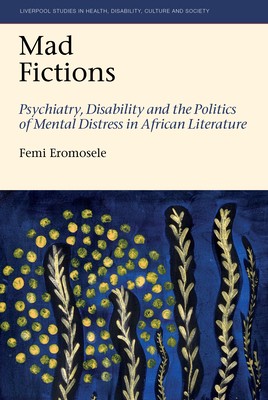
- We will send in 10–14 business days.
- Author: Femi Eromosele
- Publisher: Liverpool University Press
- ISBN-10: 1836244770
- ISBN-13: 9781836244776
- Format: 15.6 x 23.4 x 1.6 cm, kieti viršeliai
- Language: English
- SAVE -10% with code: EXTRA
Reviews
Description
Mad Fictions is the first book to place African literature in conversation with mad studies and disability studies, offering a groundbreaking reassessment of how madness is represented in African fiction. Challenging dominant readings that reduce madness to a metaphor for collective suffering, Femi Eromosele insists that it is both a site of personal distress and a locus for social justice discourse.
The book argues that the simultaneous ubiquity and invisibility of madness in African literary scholarship stems from the dominance of nationalist frameworks in the production of political legibility. It explores the way African writers situate madness at the intersection of the individual and collective body, alternatively upholding and dissolving the boundaries between selfhood and national belonging. Throughout, it explores topics including:
- Psychiatric power and violence.
- The imbrication of madness and the nation.
- The political conditions for the emergence of a Mad discourse.
- The possibility of narrating a life in the grip of mental distress.
- The importance of Indigenous and psychiatric epistemologies.
Eromosele pushes for an attentiveness to the links between reading practices and sites of exclusion embedded in both culture and politics, a relationship he describes as 'narrative comorbidity'.
Mad Fictions reorients critical discussions toward the lived realities of mental distress, while challenging the nationalist paradigms that have long dominated African literary scholarship.
EXTRA 10 % discount with code: EXTRA
The promotion ends in 23d.16:58:51
The discount code is valid when purchasing from 10 €. Discounts do not stack.
- Author: Femi Eromosele
- Publisher: Liverpool University Press
- ISBN-10: 1836244770
- ISBN-13: 9781836244776
- Format: 15.6 x 23.4 x 1.6 cm, kieti viršeliai
- Language: English English
Mad Fictions is the first book to place African literature in conversation with mad studies and disability studies, offering a groundbreaking reassessment of how madness is represented in African fiction. Challenging dominant readings that reduce madness to a metaphor for collective suffering, Femi Eromosele insists that it is both a site of personal distress and a locus for social justice discourse.
The book argues that the simultaneous ubiquity and invisibility of madness in African literary scholarship stems from the dominance of nationalist frameworks in the production of political legibility. It explores the way African writers situate madness at the intersection of the individual and collective body, alternatively upholding and dissolving the boundaries between selfhood and national belonging. Throughout, it explores topics including:
- Psychiatric power and violence.
- The imbrication of madness and the nation.
- The political conditions for the emergence of a Mad discourse.
- The possibility of narrating a life in the grip of mental distress.
- The importance of Indigenous and psychiatric epistemologies.
Eromosele pushes for an attentiveness to the links between reading practices and sites of exclusion embedded in both culture and politics, a relationship he describes as 'narrative comorbidity'.
Mad Fictions reorients critical discussions toward the lived realities of mental distress, while challenging the nationalist paradigms that have long dominated African literary scholarship.


Reviews